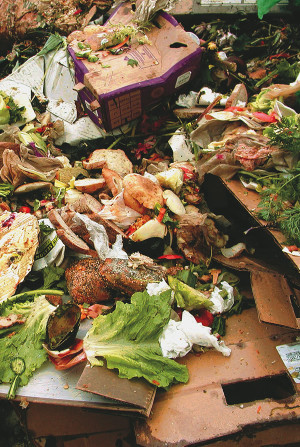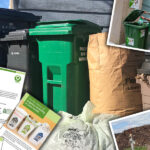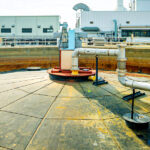A ruling that prohibited an area composting facility from receiving commercial food waste commingled with soiled paper, corrugated and compostable products ultimately led to new policy.
Katrina Mendrey
BioCycle July 2014
Metro, the regional government in the Portland, Oregon metropolitan area, recently made a difficult decision. After nine years of operating a commercial organics program at its Metro Central Transfer Station that allowed everything from serviceware to waxed cardboard, the list of allowable compostables has shifted to food only. No paper towels. No dirty napkins. No pizza boxes. The new food-only policy affects commercial generators serviced by Metro Central.

The first phase of the commercial organics food-only policy at the Metro Central Transfer Station goes into effect in November with restrictions on loads containing regular and waxed cardboard. Image courtesy of Metro
The rethinking of accepted feedstocks has come after the region’s long struggle to find a facility capable of processing the city’s organic residuals. When the City of Portland and Metro ramped up composting to offer services for both commercial and residential customers, organic residuals from both streams were sent primarily to Nature’s Needs, a Recology-operated facility approximately 20 miles from the heart of Portland in neighboring Washington County. Recology had invested in facility upgrades to allow for food waste composting, however, odors at the facility led the Washington County Board of Commissioners to ban commercial organics from being processed at Nature’s Needs. Only residential organics can be composted at this time.
For a brief period, commercial organics were trucked all over the Pacific Northwest to be composted in other communities. But this was not seen as a long-term solution, according to Paul Slyman, Metro’s Parks and Environmental Services Director. “At some point you have to ask yourself what is the net benefit,” he says, noting the transportation costs and emissions reduced the environmental benefits of composting these materials.
A solution, however, was found in JC-Biomethane, a wet anaerobic digester in Junction City, Oregon, about 100 miles south of Portland. “When JC-Biomethane was permitted it was a wonderful solution because it focused solely on the commercial stream and allowed Nature’s Need to focus on the residential,” explains Slyman. Currently 70 percent of the area’s commercial organics are trucked to JC-Biomethane and digested to produce biogas, compost and liquid fertilizer. The digester began operating in July 2013.
Feedstock Challenges
A problem arose fairly quickly with the incoming organics. The list of acceptable items originally drafted for Metro’s commercial organics program was based on what could be composted at the facility owned by the original contractor, not by an anaerobic digester. In addition, the level of cardboard has exceeded what was originally expected. “It was anticipated that nonfood items would be in the loads at a rate of 5 percent by mass,” says Dean Foor, owner of JC-Biomethane. “It was not expected that the nonfood items, specifically cardboard, would be in such great quantity that throughput of our preprocessing system would be significantly reduced.”
Foor reports that since beginning operation last July, contamination in loads has varied from 10 to 15 percent. These contaminants, including waxed cardboard and residual plastics, do not necessarily hinder digestion, but rather cause problems with the throughput of the bioseparator and reduce the quality of fiber after digestion. The facility uses a Hybag AG bioseparator to depackage and size reduce incoming materials prior to anaerobic digestion. The cardboard was reducing throughput of the bioseparator by 25 percent or more compared to food waste, according to Foor. “This reduction comes from the fact that cardboard is much more dense, causes higher friction, and the waxes in the waxed corrugated act to gum up movement,” he explains. In addition, the cardboard has little to no energy value.
JC-Biomethane has been managing contamination by visually inspecting loads on arrival and prior to bioseparation. However, the level of contamination, specifically from nonfood items previously deemed acceptable, has greatly reduced efficiency of the overall system, notes Foor.
Policy Change
In March 2014, Metro formally announced its decision to no longer allow nonfood items with the exception of approved compostable bags in loads of commercial organic materials going to Metro Central Transfer Station. The new standards will be implemented in two phases beginning in November 2014 with restrictions on loads containing regular and waxed cardboard. By March 2015, food scraps loads can only contain food. Contaminated loads will be treated as garbage — a tipping fee of $95/ton instead of $65/ton for food scraps. Acceptable residential organics will continue to include soiled paper, pizza boxes and approved compostable bags (no other compostable products are allowed).
“We don’t get joy in creating headaches for our [participating] businesses,” says Slyman. “As an advisory council we want to talk about solutions.” Metro and its local government partners are currently meeting with many of these commercial enterprises, including grocery stores, to provide support and assistance. In addition, they are working with haulers and local governments that have direct relationships with the customers to help ease the transition.
Ame LeCocq, Group Environmental Manager at Recology, which manages the Metro Central Transfer Station where the majority of the area’s commercial and residential food scraps are delivered, believes the new policy will result in cleaner feedstocks. “Operationally the changes will allow for greater focus on the removal of noncompostable contaminants and create a cleaner feedstock,” she says. Recology has worked closely with processors, customers and haulers in partnership with Metro to find solutions.
Republic Services is the contractual operator of Metro South Transfer Station and an additional transfer station in Wilsonville, Oregon. Metro’s food-only policy requirements do not apply at these transfer stations as commercial organics from Metro’s program coming through these transfer stations are composted by a Republic Services affiliate, Pacific Region Compost (PRC). Located in Corvallis (about 80 miles from Portland), PRC composts approximately 120,000 tons/year of organic residuals — primarily residential source separated organics (yard trimmings with food waste).
According to Jordan Trimmer, Sales and Marketing Representative at Republic Services, organic residuals from commercial customers represent about 10 percent of the loads accepted. While these loads do contain some level of contamination, Trimmer reports that this is usually screened out. Additionally, while waxed cardboard is considered a contaminant, in small quantities it can be broken down in the composting process at PRC. “It just takes more time,” he notes.
Republic Services’ customers include the Moda Center, where the Portland Trailblazers play. According to Trimmer, the policy change will not affect its current large commercial customers such as the Moda Center. “Currently this policy has minimal effect on us,” he explains. “We will continue to work with our customers to find solutions that will work for everyone.” With limited composting options, however, Trimmer notes the demand is high for organics processing infrastructure. “We can’t expand our facility fast enough to take everything.”
Katrina Mendrey is a Contributing Editor to BioCycle.













